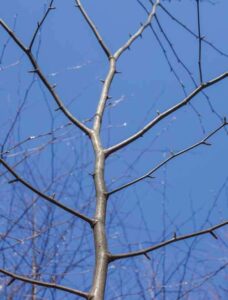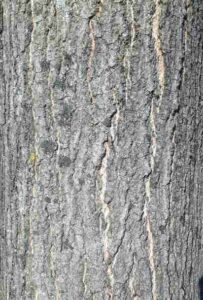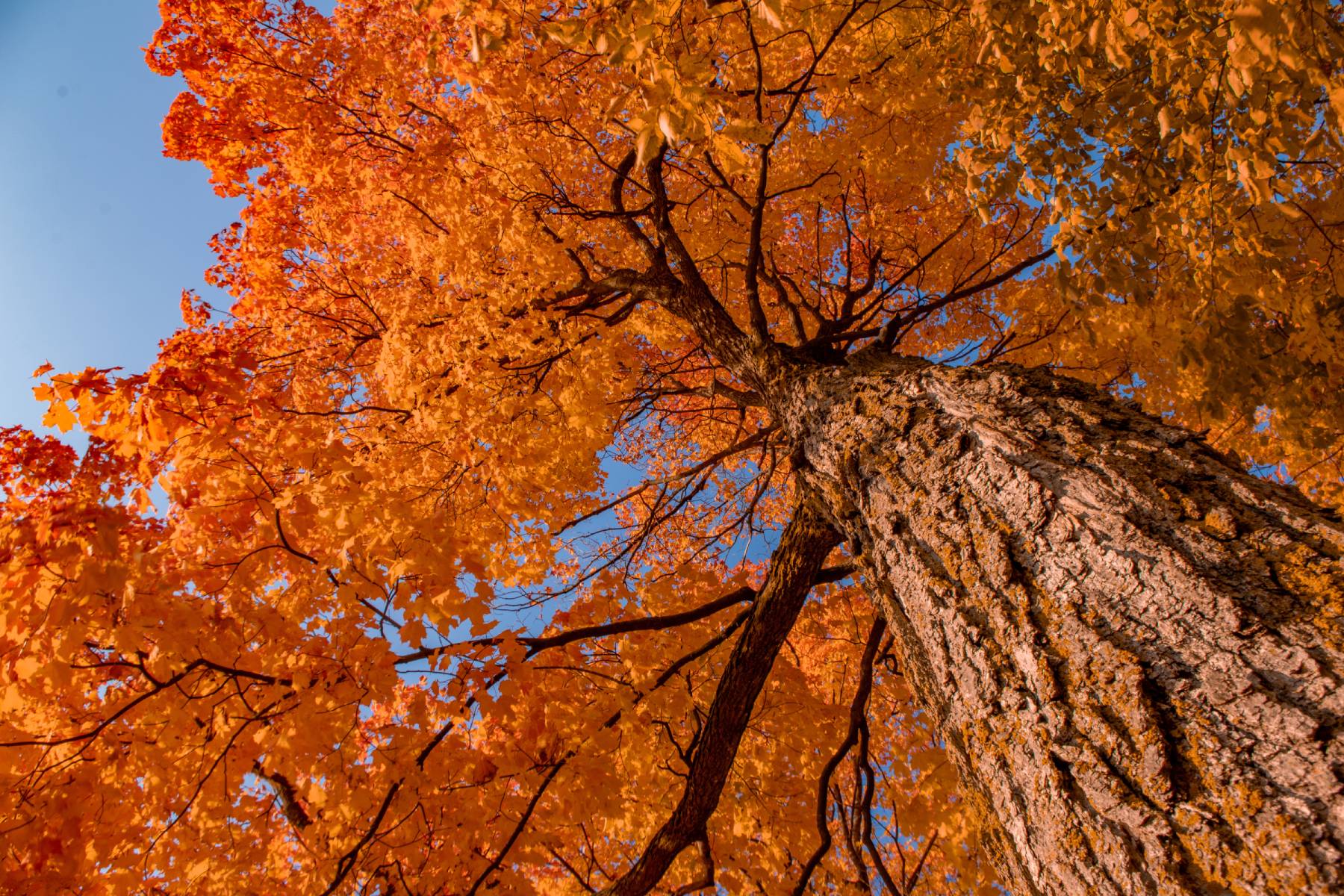Sugar Maple Tree Identification
Sugar maple is the second most common tree throughout the Northeast. Its widespread life span is 300 years, and it could effectively dwell as a lot as 500 years. Which implies many huge mature bushes populate our space. Some areas of the Northeastern forest are primarily composed of sugar maples. With the bushes in shut proximity, it is simple to faucet them for his or her sap. An area of many maple bushes being tapped for sap referred to as a “sugarbush.” The sap is then transported to the sugarhouse the place it is boiled proper right down to make maple syrup and completely different maple-flavored merchandise. In March, a popular dessert at church suppers in New England is “sugar-on-snow,” made by boiling sap after which pouring it on a bowl filled with hard-packed snow.
The place Do Sugar Maple Timber Develop?
Sugar maple is perhaps found all by way of the Northeast. It has tailor-made to a variety of soil kinds, so it is not restricted to explicit conditions. It is also tolerant of shade, which implies it would not need direct daylight to develop. Thus, it could effectively start life even when over-shadowed by additional mature bushes. It’s among the many dominant species in blended hardwood forests, so often do you have to uncover one tree, yow will discover many all by way of the forest, in distinction to crimson maple, it would not tolerate moist roots, so it will not be current in swampy or boggy areas.
- Sap strains
- roadside rows
- branches develop upward, oval kind
- spiral progress
Sugar Maple Reverse Branching
Must you see at least one pair of reverse branches, it is each a maple or an ash.


Sugar Maple Sap Strains
Maple syrup is usually created from the sap of the sugar maple, so wherever you see sap buckets– or, additional often at this time, plastic tubing working by the use of the woods– you are seeing a grove of maple bushes, which referred to as a “sugarbush”. The sap strains are under damaging stress, which causes the sap to be drawn from the bushes and delivered to a sap dwelling the place it is collected after which boiled down into maple syrup.


Sugar Maple Roadside Rows
Sap is gathered throughout the early spring when snow is usually nonetheless on the underside. Throughout the outdated days, the sap was collected in buckets on the bushes, and workmen would go spherical with a horse- or oxen- drawn sleigh with an infinite barrel on it to gather all the sap from the buckets. Evidently, it was troublesome to draw a sleigh by the use of thick woods, so to make it easier to gather the sap, settlers planted sugar maples alongside the road. Must you see bushes planted in a row alongside a thoroughfare, outdated or new, look intently. Chances are high excessive good, notably in New England, that they are sugar maples.


Sugar Maple Branches Develop Upward, Oval Type
It may seems self-evident that branches develop upward, nevertheless not all of them do. Some bushes even have branches that develop downward, and completely different bushes have branches that develop in all directions. The branches of open-grown sugar maples, nonetheless, do all develop upward in a primary oval sort. The principle limbs and branches every develop vertically with slender concepts and kind the distinctive oval kind. You will usually see a maple tree rising by itself in the midst of a self-discipline. Virtually positively an early farmer each planted it or left it when the land was cleared to produce a spot to eat lunch and leisure in its shadow when working throughout the self-discipline.


Sugar Maple Spiral Improvement
Not all maples develop in spirals, nevertheless ample do that it is a secondary attribute for identification. Some scientists speculate that this attribute superior to help the tree stand as much as extreme winds.


Pink Maple Tree Identification
Pink maple referred to as crimson on account of its twigs, buds, and flowers are all crimson, and its leaves flip a flaming crimson throughout the fall–in reality, its leaves are among the many many earliest throughout the fall to start out out turning. It is also primarily essentially the most widespread deciduous tree throughout the japanese U.S., ready to develop in moist and dry conditions, poor and rich soils, and in bottom-lands and at elevation.

The place to seek for Pink Maple Timber
Consistent with the USDA Forest Service, 30 % of all bushes throughout the Northeast are crimson maples. They appear all by way of the Northeast, being one of many essential adaptable bushes. They’re usually found just about wherever–from swamps to poor dry soils, and every state of affairs in between. They are going to moreover develop at quite a lot of elevations, from sea stage to about 3,000 toes.
- Reverse branching
- Pink twigs, buds, flowers, and fall color
- Bull’s-eyes throughout the Bark
- Swamp maple
Pink Maple Reverse Branching
Solely three bushes which will be typically encountered throughout the forests of the Northeast have reverse branching: crimson maple, sugar maple, and ash. Which implies do you have to see at least one pair of reverse branches, you already know it is each a maple or an ash. On account of ash branches are so in distinction to maple branches, it is simple to tell which one you are . Every crimson maple and sugar maple have reverse branching.


Pink Maple with crimson twigs, buds, flowers, and fall color
There’s one thing crimson about crimson maple 12 months spherical– crimson twigs, crimson buds, crimson flowers, and throughout the fall, crimson leaves. It is laborious to see buds or twigs on a tall mature tree, so they are not quite a bit help in determining it. On youthful bushes or bushes with new progress inside attain, buds and twigs is perhaps useful. Pink maple leaves flip good crimson throughout the fall, often sooner than the leaves of various bushes being to indicate. Then, very early throughout the spring, it’s among the many first bushes to flower, prolonged sooner than it’s leaves appear.


Pink Maple bull’s-eyes throughout the bark
Must you see a tree with a pattern in its bark that seems like a bull’s-eye you might decide it as a crimson maple indubitably. This unusual pattern throughout the bark is a trunk canker attributable to a fungus. Concurrently a tree ages, the bull’s-eye pattern persists.


Pink “Swamp” Maple
Must you see reverse branching on a tree and it is rising in a swamp, lowland, or correct subsequent to water, you then already know it is a crimson maple. Pink maple is commonly referred to as swamp maple on account of it could effectively thrive in moist areas, whereas sugar maple cannot tolerate these conditions.


I on a regular basis actually really feel at dwelling the place the sugar maple grows… very good in autumn, a fountain of coolness within the summertime, sugar in its veins, gold in its foilage, warmth in its fibers, and effectively being in it the 12 months spherical.
— John Burroughs, Under the Maples
Sugar Maple vs. Pink Maple
It is not simple to tell crimson maple from sugar maple. As Chuck Wosster writes in Northern Woodlands journal, “telling crimson maple from sugar maple can vex even seasoned botanists once in a while.” That acknowledged, there are a selection of keys that help distinguish the two maples
- Pink maple found near water
- Pink vs. brown twigs and buds
Pink Maple Found Near Water
Pink maple–or swamp maple– can tolerate having moist roots, so for those who already know a given tree is a maple attributable to reverse branching, and whether or not it’s rising in or near water or a moist area, it is a crimson maple.
Bark Variations
Pink maple will also be know as comfy maple, whereas sugar maple will also be known as laborious maple. The “laborious” in “laborious maple” is often mirrored throughout the look of the tree’s bark. A great, hard-looking bark is perhaps found on some sugar maples nevertheless not on crimson maples.
Bulls-eyes typically appear in crimson maple bark nevertheless in no way in sugar maples.



As a primary rule, do you have to try and peel the bark off a crimson maple, yow will discover it comes off merely, nevertheless sugar maple bark is rigid and would not come off, even when it looks like it is peeling.


Pink vs. Brown Twigs and Buds
Throughout the Introduction, I acknowledged that I might avoid using twigs and buds in identification on account of they’re so laborious to see or pay money for when dealing with a mature tree. However, on account of it is typically troublesome to inform aside betwen sugar and crimson maple, I’ve included them proper right here. If nothing else, they are often utilized to find out seedlings– which may current a clue to the mature bushes spherical them.
Pink maple has crimson twigs and buds (and crimson leaves throughout the fall and crimson flowers throughout the spring). The leaves of sugar maple, nevertheless, often flip yellow or golden throughout the fall, and sugar maples have brown twigs and buds.


Throughout the forests of the Northeast, crimson maple is the commonest of all deciduous bushes. In actuality, there are twice as a number of them as the following most common, sugar maple. Thus, do you have to determine a tree is a maple and guess that it is a crimson maple, you may seemingly be correct two out of thrice.

Excerpted from A Novices Data to Recognizing Timber of the Northeast © by Mark MIkolas, pictures by The Countryman Press, used with permission from The Countryman Press.
